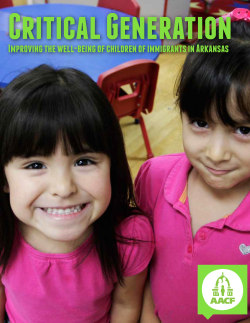
Any discussion of Arkansas’s future is incomplete without understanding the challenges faced by children
in immigrant families. They account for the majority of growth in Arkansas’ child population in the last
decade. This new population, mostly Hispanic and almost all U.S. citizens, presents new opportunities in
our effort to ensure that all children in Arkansas reach their full potential.
Our state’s economic future depends on our success at meeting this challenge. The number of children
with foreign-born parents quadrupled over the last two decades. In comparison, the growth rate for
children of native born parents was about 15 percent. Children of immigrants are key to our state’s longterm economic outlook, and their opportunity to learn and flourish is central to our state’s interest.
Again and again in Arkansas, we’ve learned that investment in children pays off and that failure to meet
their needs – in particular in education and health – holds us back economically. That’s because healthy and well-educated children are more likely to succeed in school and are less likely to need remediation
or wind up in the juvenile justice system. Because children of immigrants face more barriers than others – higher poverty, uninsured, and school dropout rates than the overall population – we must find ways to overcome these obstacles with policies that give all children a chance to meet their full potential.
